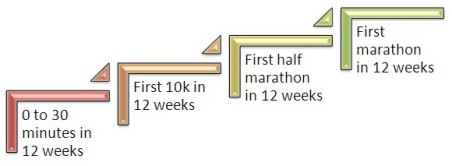How to Run a Marathon - The Six Things I Thought You Should Know
Wondering how to run a marathon? Well, just read this page.
You'll learn all the marathon running tips you need to know.
Before you know it, you'll be running a marathon successfully.
The following running tips should get you ready.
How to Run a Marathon Tip #1 - Build it Up
You can do a marathon within three or four months. Unless you are very fit now, you wouldn't be running it the whole way. On this page I am assuming you want to learn how to run a marathon, not walk it. And that you are starting from a zero base.You'll see soon enough when you'd be able to run a marathon based on your starting point.
In order for you to get there, my advice would be to not attempt a marathon unless you first have experience running other long distance races.
So, in other words, get some experience under your belt. Build it up. Train for a 5k first, then a 10k, then a half marathon, then a marathon.
I hear you thinking, how much time will that take? Well, you can get ready for a 10k in three to six months, then another three months for the half and then another three months for the full marathon. So, that's nine to twelve months preparation.
Again, you can do it faster than that, there are pograms that can get you ready in 12 weeks! However, I like the build up. Chances are that you'll enjoy the marathon a lot more, will continue your running afterwards and that you'll actually be able to run the whole distance!
How to Run a Marathon Tip #2 - So... First Get Ready for Shorter Distances
 As per the
previous running tip, when you want to learn how to run a
marathon, I'd advise you to first build it up and get ready for shorter
distances.
As per the
previous running tip, when you want to learn how to run a
marathon, I'd advise you to first build it up and get ready for shorter
distances.
I'll provide you with a simple nine month plan to get you to go from 1 minute of running to running a half marathon.
Now, I have had people actually work through these running programs.
And I have had many people write to me saying that it was totally doable.
That they love how their fitness has changed, how they'd never thought it was possible, etc.
In other words, you can do this too.
As with all running programs on the net: feel free to make adjustments as you see fit. You might feel that the first program is way to easy for you. You might feel that it is too hard. Skip weeks, repeat weeks as you feel is necessary. There is not a one-size-fits-all approach. Find your own way. With that said... here it goes:
Beginners Running Program 3 - From 0 to 30 Minutes in 12 Weeks
Use a run/walk program that gets you to run 30 minutes non-stop in 12 weeks.
10k Running Program - From 30 Minutes to a 10K in 12 Weeks
Once you are able to run 30 minutes non-stop you can get ready for a 10k race. Again, this is a 12 week running program. By the end you'll be able to run about 60-70 minutes non-stop, which should get you to finish a 10k (or close to it).
Half Marathon Running Program - From 10k To Half Marathon in 12 Weeks
And after that I have got a beginner half marathon running program available that gets you from 10k to half marathon, again in twelve weeks time.
Here are the links to these programs:
Beginners Running Program 3 - From 0 to 30 minutes of running.
10k Running Program - From 30 minutes to a 10k
Half Marathon Running Program - From 10k to a Half Marathon

So, that's 3 x 12 = 36 weeks, roughly nine months. Already have a fitness base? Then you might be able to cut a few corners here or there. You might be able to start half way. That's a choice you will have to make. However, I'd still advise you to take your time to build up your running.
Also check the increasing mileage safely page for running tips regarding build-up of mileage. Seriously, do it. In any given year 90% of runners are sidelined due to injuries. Runners are very injury-prone. Why? Well, mostly because we are really stubborn and push and push when we should take it a bit easier.
Read the page. Start listening to your body!
How to Run a Marathon Tip #3 - Start of Marathon Training ... Yep... More Build Up
So, by now, you are starting to be a somewhat experienced distance runner. You have successfully completed a few races, you are quite used to running three or four times per week by now and have done so for quite a long time, i.e. nine months.What you need to do now is to build up a little bit more.
Yes, the first period of marathon training you will want to increase your mileage further. When you are through with the half marathon running program you are used to doing 90 minute runs. Well, at least, you have done a few of them.
In marathon training you build up that weekly long run to be longer and longer. You will want to be able to hit the 20 mile mark a few times in your training.
Most of your weekly runs should be "easy". Any run that takes you at least 90 minutes to complete will be of great help in preparing you for the race.
 Generally, you will find it easiest to do the really long run in the weekend.
Generally, you will find it easiest to do the really long run in the weekend.But if you have a flexible work week then you might be able to change things up and do your long run during the week. You just need to find that solid block of time to get it done.
Whatever you do, one of the keys to running a successful marathon is to back it up with a second (mid-week) semi-long run of at least 90 minutes in length.
When you run for more than 90 minutes at a time, your body is learning how to use its energy reserves more efficiently.
You'll need this as the 26.2 miles marathon distance is actually too long for most of us.
At some point 99.9% of us will have burnt through all their easy-to-burn fuel, glycogen.
When that happens your body needs to change to burning fat only. This is the moment many people recognize in their marathon as the moment "the lights go out". They suddenly find themselves from going strong to feeling completely empty.
The way to guard yourself against that is to get lots of these longer runs in. When it comes to marathon training, getting your body and your mind used to the idea of running non-stop for a very long time is of the utmost importance.
There are other important elements that need to be mentioned here. They will help you as well to ensure you don't run out of energy during the marathon. They are:
Check out the articles about these topics:


How far do I need to run in training?
A marathon is, needless to say, 26.2 miles, but you do not need to run more than 20 miles for training purposes.
When the day of the race comes, you will be rested, your adrenaline will be flowing, and your body will be prepared for running the extra miles because of your training regimen.
Having said that, try to make sure you hit 20 miles a number of times in training.

How to Run a Marathon Tip #4 - Consistency...
When you are in full marathon training mode, you will need to maintain a consistent regimen. You will be running four to five days per week, generally. Try to maintain that throughout the training period.You can make an exception for the final two or three weeks before the race when you taper. Some marathon programs allow you to reduce to three sessions in the week, some keep up the training with four or five days, but severely decrease the mileage you'll be putting in.
The long run is very important. I have highlighted that before. You need to get the long run in on a weekly basis. Preferably backed up by another semi-long run.
If that is priority number one, then priority number two should be to get out four times a week at least. Every week. No exceptions.
When you keep on getting out there week after week after week your fitness will build and build and build. Dropping off or thinking you'll be okay with a few weeks of lighter training is dangerous.
You will stagnate and once you have dropped a few training sessions, you are likely to drop more. So, aim for consistency. This does not mean that every run should be a full-blown long run or extra tough run.
Quite a few of those runs will be easy five to eight milers, which you can do in 45 - 70 minutes or so. But getting that mileage in is very important.
Most appropriate marathon running programs will let you have one weekly long run and one weekly semi-long run as main workouts. These are then combined with some shorter workouts. Some of these would be easy runs, some of these would be quality (speed) workouts... let's talk about that next.
How to Run a Marathon Tip #5 - How About Speed...?
So, yes, speed comes into the picture. Maybe not quite as much as you'd like. I know many starting runners who run every training like it is their last. Not you, I hope?You can make a real mistake by running way too fast. It is less enjoyable, it causes more injuries, it burns you out, etc.
When you are starting off with running, you should put more focus on endurance and time on your feet than on so called quality workouts like tempo runs and interval sessions. The marathon is by definition an endurance event.
A great marathon training program takes that into account. What it will also do however is provide you with a good balance between slower and faster runs. You make most improvements when your training covers off on a range of running speeds.
Therefore, for optimal preparation, you should consider getting a good marathon plan. Don't use the usual free marathon training ideas for plans that you can find on Internet. There's too much shallow or just wrong "advice" about marathon training on the Internet.
Many running programs just do a bland easy run after easy run after easy run. Not optimal.
It's such a shame when I see people throwing hours and hours of training time away when I can see from the marathon training schedule they are using that it is not optimal, or worse, that there are big gaping holes in it.
How to Run a Marathon Tip #6 - Take Care of Yourself
 It's very important that on your days off
each week you get plenty of rest.
It's very important that on your days off
each week you get plenty of rest. You need to take very good care of yourself when training for a marathon race.
A crucial part of this is how much sleep you get.
Another component is the runner's diet.
A good diet consists out of plenty of carbohydrates and protein as well as "good fats".
As a marathon runner you probably need a bit more food than the rest of us, because you are logging so many miles.
Keep an eye on your weight as your training progresses.
Overweight at the moment? Then it's quite okay to drop the pounds while getting ready for your marathon. Every pound you lose you don't have to carry to the finish line!
But when your weight is already in the healthy range, do keep an eye on not losing too much weight. There is a balance somewhere between being light on your feet and getting too light and potentially weaker.
Keep in mind that when you don't have much fat to lose, the weight you lose is most likely coming from muscles, so you might make yourself weaker.
So, aim for skinny, but when people start counting your ribs, it's probably time to make sure you eat a bit more... :)
That's about it for this article.
There are plenty more things that are important when you want to learn how to run a marathon.
Don't take preparation lightly and make sure you learn more about marathon running by checking out the other pages in the marathon training section





